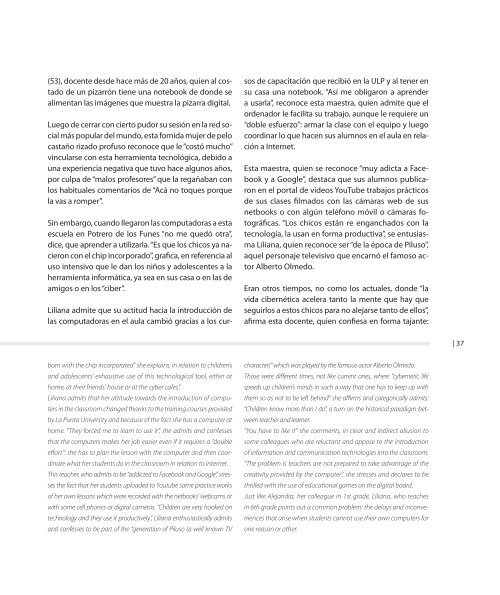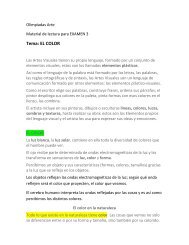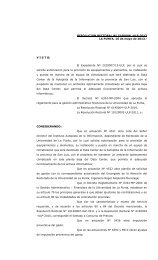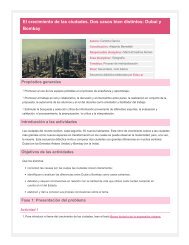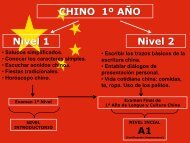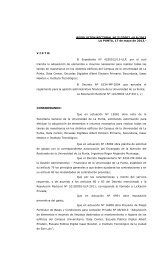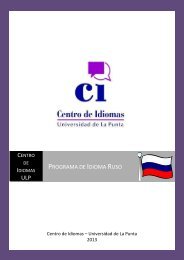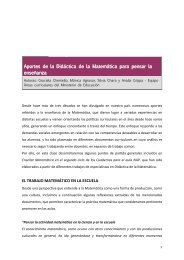e-Book PDF - Universidad de La Punta (ULP)
e-Book PDF - Universidad de La Punta (ULP)
e-Book PDF - Universidad de La Punta (ULP)
You also want an ePaper? Increase the reach of your titles
YUMPU automatically turns print PDFs into web optimized ePapers that Google loves.
(53), docente <strong>de</strong>s<strong>de</strong> hace más <strong>de</strong> 20 años, quien al costado<strong>de</strong> un pizarrón tiene una notebook <strong>de</strong> don<strong>de</strong> sealimentan las imágenes que muestra la pizarra digital.Luego <strong>de</strong> cerrar con cierto pudor su sesión en la red socialmás popular <strong>de</strong>l mundo, esta fornida mujer <strong>de</strong> pelocastaño rizado profuso reconoce que le “costó mucho”vincularse con esta herramienta tecnológica, <strong>de</strong>bido auna experiencia negativa que tuvo hace algunos años,por culpa <strong>de</strong> “malos profesores” que la regañaban conlos habituales comentarios <strong>de</strong> “Acá no toques porquela vas a romper”.Sin embargo, cuando llegaron las computadoras a estaescuela en Potrero <strong>de</strong> los Funes “no me quedó otra”,dice, que apren<strong>de</strong>r a utilizarla. “Es que los chicos ya nacieroncon el chip incorporado”, grafica, en referencia aluso intensivo que le dan los niños y adolescentes a laherramienta informática, ya sea en sus casa o en las <strong>de</strong>amigos o en los “ciber”.Liliana admite que su actitud hacia la introducción <strong>de</strong>las computadoras en el aula cambió gracias a los cursos<strong>de</strong> capacitación que recibió en la <strong>ULP</strong> y al tener ensu casa una notebook. “Así me obligaron a apren<strong>de</strong>ra usarla”, reconoce esta maestra, quien admite que elor<strong>de</strong>nador le facilita su trabajo, aunque le requiere un“doble esfuerzo”: armar la clase con el equipo y luegocoordinar lo que hacen sus alumnos en el aula en relacióna Internet.Esta maestra, quien se reconoce “muy adicta a Facebooky a Google”, <strong>de</strong>staca que sus alumnos publicaronen el portal <strong>de</strong> vi<strong>de</strong>os YouTube trabajos prácticos<strong>de</strong> sus clases filmados con las cámaras web <strong>de</strong> susnetbooks o con algún teléfono móvil o cámaras fotográficas.“Los chicos están re enganchados con latecnología, la usan en forma productiva”, se entusiasmaLiliana, quien reconoce ser “<strong>de</strong> la época <strong>de</strong> Piluso”,aquel personaje televisivo que encarnó el famoso actorAlberto Olmedo.Eran otros tiempos, no como los actuales, don<strong>de</strong> “lavida cibernética acelera tanto la mente que hay queseguirlos a estos chicos para no alejarse tanto <strong>de</strong> ellos”,afirma esta docente, quien confiesa en forma tajante:| 37born with the chip incorporated” she explains, in relation to children’sand adolescents’ exhaustive use of this technological tool, either athome, at their friends’ house or at the cyber cafes”.Liliana admits that her attitu<strong>de</strong> towards the introduction of computersin the classroom changed thanks to the training courses provi<strong>de</strong>dby <strong>La</strong> <strong>Punta</strong> University and because of the fact she has a computer athome. “They forced me to learn to use it”, she admits and confessesthat the computers makes her job easier even if it requires a “doubleeffort”: she has to plan the lesson with the computer and then coordinatewhat her stu<strong>de</strong>nts do in the classroom in relation to internet.This teacher, who admits to be “addicted to Facebook and Google”, stressesthe fact that her stu<strong>de</strong>nts uploa<strong>de</strong>d to Youtube some practice worksof her own lessons which were recor<strong>de</strong>d with the netbooks’ webcams orwith some cell phones or digital cameras. “Children are very hooked ontechnology and they use it productively”, Liliana enthusiastically admitsand confesses to be part of the “generation of Piluso (a well known TVcharacter)” which was played by the famous actor Alberto Olmedo.Those were different times, not like current ones, where “cybernetic lifespeeds up children’s minds in such a way that one has to keep up withthem so as not to be left behind” she affirms and categorically admits:“Children know more than I do”, a turn on the historical paradigm betweenteacher and learner.“You have to like it” she comments, in clear and indirect allusion tosome colleagues who are reluctant and appose to the introductionof information and communication technologies into the classroom.“The problem is teachers are not prepared to take advantage of thecreativity provi<strong>de</strong>d by the computer”, she stresses and <strong>de</strong>clares to bethrilled with the use of educational games on the digital board.Just like Alejandra, her colleague in 1st gra<strong>de</strong>, Liliana, who teachesin 6th gra<strong>de</strong> points out a common problem: the <strong>de</strong>lays and inconveniencesthat arise when stu<strong>de</strong>nts cannot use their own computers forone reason or other.


